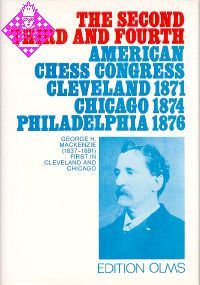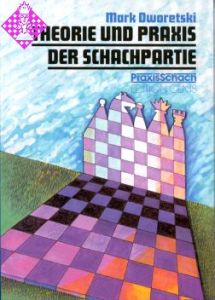Artikelnummer
LXOLMTACC
Autor
The 2nd, 3rd and 4th American Chess Congress
430 Seiten, Kunstlederband, Reprint, Olms, 1985
Aus der Reihe »Tschaturanga«
Final vergriffen
| EAN | 9783283000899 |
|---|---|
| Gewicht | 460 g |
| Hersteller | Olms |
| Breite | 14 cm |
| Höhe | 19,5 cm |
| Medium | Buch |
| Erscheinungsjahr | 1985 |
| Autor | Georg Olms |
| Reihe | Tschaturanga |
| Sprache | Englisch |
| ISBN-10 | 3283000891 |
| ISBN-13 | 9783283000899 |
| Seiten | 430 |
| Einband | Kunstlederband |
| Name | Edition Olms |
|---|---|
| Adresse | Rosengartenstraße 13B Bubikon/Zürich 8608 Schweiz |
| Internet | www.edition-olms.com |
| info@edition-olms.com |
Verantwortlicher Importeuer:
| Name | Schachversand Niggemann |
|---|---|
| Adresse | Schadowstraße 5 48163 Münster Deutschland |
| info@schachversand.de | |
| Internet | www.schachversand.de |
The records of three American chess congresses have been brought together in this anthology: the 2nd (Cleveland 1871), the 3rd (Chicago 1874) and the 4th (Philadelphia 1876, coinciding with the world exhibition). Captain George H. Mackenzie emerged as the winner in both Cleveland and Chicago. He followed up these first great successes with many more, such as his equal first with Grundy in the 5th American Congress in New York in 1880 and clear first Prize at the 5th Congress of the German Chess Federation in Frankfurt am Main in 1887. In Cleveland, Mackenzie's victory was a decisive one (2 points ahead of Henry Hosmer), although in Chicago he finished only half a point ahead of the same player.
James Mason's first prize in Philadelphia also signified the start of his long and successful chess career. All three congresses were played over two rounds, but in Cleveland drawn games were not counted. All Mackenzie's opponents in the 2nd and 3rd Congresses were American; Mason won in Philadelphia against an American field plus the Englishman Bird and the Cuban Martinez.Christiaan M. Bijl
James Mason's first prize in Philadelphia also signified the start of his long and successful chess career. All three congresses were played over two rounds, but in Cleveland drawn games were not counted. All Mackenzie's opponents in the 2nd and 3rd Congresses were American; Mason won in Philadelphia against an American field plus the Englishman Bird and the Cuban Martinez.Christiaan M. Bijl
The records of three American chess congresses have been brought together in this anthology: The 2nd (Cleveland 1871), the 3rd (Chicago 1874) and the 4th (Philadelphia 1876, coinciding with the world exhibition). Captain George H. Mackenzie emerged as the winner in both Cleveland and Chicago. He followed up these first great successes with many more, such as his equal first with Grundy in the 5th American Congress in New York in 1880 and clear first Prize at the 5th Congress of the German Chess Federation in Frankfurt am Main in 1887. In Cleveland, Mackenzie's victory was a decisive one (2 points ahead of Henry Hosmer), although in Chicago he finished only half a point ahead of the same player.
James Mason's first prize in Philadelphia also signified the start of his long and successful chess career. All three congresses were played over two rounds, but in Cleveland drawn games were not counted. All Mackenzie's opponents in the 2nd and 3rd Congresses were American; Mason won in Philadelphia against an American field plus the Englishman Bird and the Cuban Martinez.Christiaan M. Bijl
James Mason's first prize in Philadelphia also signified the start of his long and successful chess career. All three congresses were played over two rounds, but in Cleveland drawn games were not counted. All Mackenzie's opponents in the 2nd and 3rd Congresses were American; Mason won in Philadelphia against an American field plus the Englishman Bird and the Cuban Martinez.Christiaan M. Bijl
Mehr von Olms
-
 Stellungsbeurteilung und Plan19,95 €
Stellungsbeurteilung und Plan19,95 € -
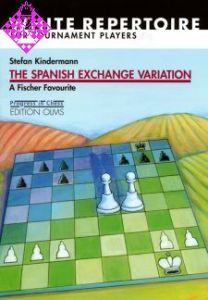 The Spanish Exchange Variation19,95 €
The Spanish Exchange Variation19,95 € -
 Taktik gewinnt!17,80 €
Taktik gewinnt!17,80 € -
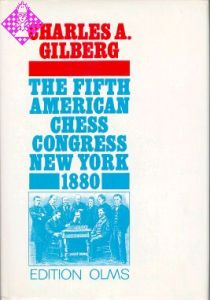 The 5th American Chess Congress35,00 €
The 5th American Chess Congress35,00 € -
 Starke Bauernregeln17,80 €
Starke Bauernregeln17,80 € -
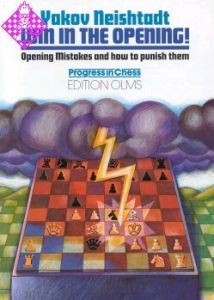 Win in the Opening!19,95 €
Win in the Opening!19,95 € - Mehr von Olms

